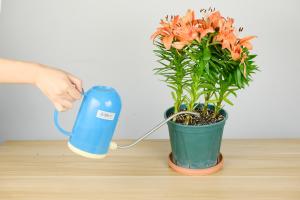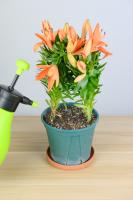Why You Should Consider Spraying Water on Plant Leaves
If you're an avid gardener, you've probably heard conflicting opinions regarding whether or not you should spray water on your plant leaves. Some argue that it can lead to fungal growth and other issues, while others believe that it can actually benefit your plants. In this article, we'll explore the benefits and drawbacks of spraying water on plant leaves, and help you decide whether or not it's the right approach for your garden.
The Benefits of Spraying Water on Plant Leaves
One of the primary benefits of spraying water on plant leaves is that it can help to increase humidity, which many plants require to thrive. This is particularly important for tropical plants or those that are native to areas with high humidity levels. When you spray water on the leaves, the small droplets will evaporate, releasing moisture into the air and thus raising the humidity levels surrounding the plant.
Spraying water on plant leaves can also help to remove dust and other debris that can accumulate on the leaves. This can help to ensure that your plants are able to properly absorb sunlight and nutrients, as dust and debris can block the pores on the leaves.
The Drawbacks of Spraying Water on Plant Leaves
While spraying water on plant leaves can provide some benefits, there are also potential drawbacks to consider. One of the biggest concerns is that it can contribute to the growth of fungal diseases. When water is left to sit on plant leaves for too long, it can create a moist environment that is ideal for fungal growth. This can be particularly problematic in areas with high humidity, as the moisture levels may already be high.
Another concern is that water that is too cold or too hot can shock the plant and damage the leaves. Cold water can cause the plant to go into shock, while hot water can scorch the leaves, causing them to turn brown or wilt. Additionally, spraying water on the leaves during the hottest part of the day can cause the water to evaporate too quickly, before it has a chance to benefit the plant.
When to Consider Spraying Water on Plant Leaves
While there are potential drawbacks to spraying water on plant leaves, there are also situations where it can be beneficial. For example, if you live in an area with low humidity levels, spraying water on the leaves can help to increase moisture levels and create a more hospitable environment for your plants.
If you choose to spray water on your plant leaves, it's important to do so carefully and with consideration for the needs of your plants. Use water that is at room temperature, and avoid spraying the leaves during the hottest part of the day. You may also want to consider using a humidifier or other tools to help maintain optimal humidity levels in your garden.
In Conclusion...
So should you spray water on your plant leaves? The answer is that it depends on your specific situation and the needs of your plants. While there are benefits to doing so, there are also potential risks that need to be taken into consideration. With careful consideration and proper care, however, spraying water on plant leaves can be a valuable tool in helping your garden to thrive.

 how many times do yo...
how many times do yo... how many planted tre...
how many planted tre... how many pine trees ...
how many pine trees ... how many pecan trees...
how many pecan trees... how many plants comp...
how many plants comp... how many plants can ...
how many plants can ... how many plants and ...
how many plants and ... how many pepper plan...
how many pepper plan...





























